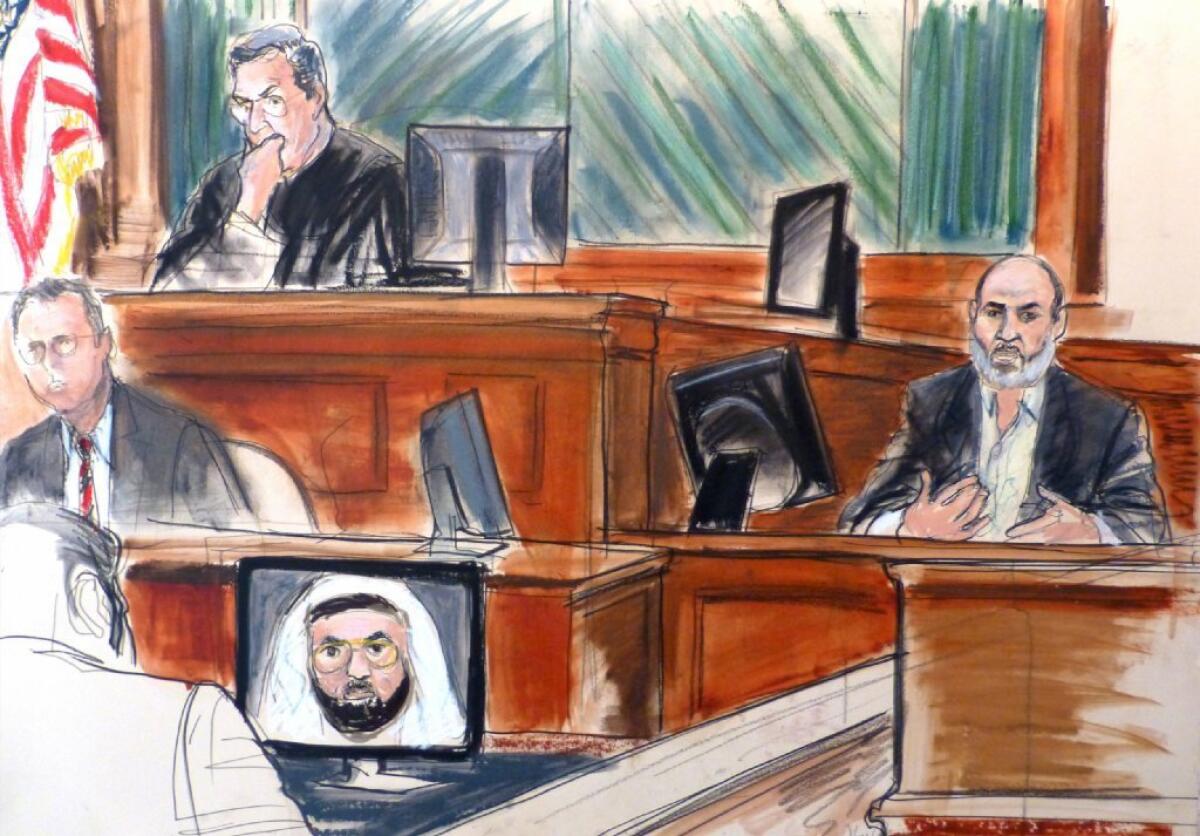Things to know about the trial of Osama bin Laden’s son-in-law

- Share via
NEW YORK -- Jurors began deliberations Tuesday in the terrorism trial of Sulaiman abu Ghaith, who is accused of being the chief propagandist for Al Qaeda in the days and months immediately following the Sept. 11, 2001, attacks. The jury broke Tuesday afternoon without reaching a verdict and will resume deliberations Wednesday.
Here are a few things to know about the case:
THE DEFENDANT: Sulaiman abu Ghaith, 48, is a Kuwaiti-born Muslim cleric and powerful orator whose speaking skills drew the attention of Osama bin Laden in 2001. At Bin Laden’s request, he delivered a speech on Sept. 12, 2001, praising the hijackings the day before, and he gave subsequent speeches and interviews urging young Muslims to wage war on America. He was arrested and handed over to U.S. officials in Jordan in February 2013. Abu Ghaith is charged with conspiring to kill U.S. nationals, conspiring to provide material support or resources to terrorists, and providing material support or resources to terrorists. A conviction could put him in prison for life.
THE DEFENSE: Abu Ghaith’s attorneys portrayed him as an innocent imam who was not speaking from the heart when he delivered his anti-American messages. They say -- and Abu Ghaith testified -- that he simply said what Bin Laden asked him to say and that the Al Qaeda leader gave him “bullet points” for each speech. They also say that none of the prosecution witnesses was able to show that Abu Ghaith was a member of Bin Laden’s inner circle or a high-ranking Al Qaeda leader, as the government alleges.
THE PROSECUTION: Prosecutors showed videos of Abu Ghaith sitting beside Bin Laden outside his mountain hide-out on Sept. 12, 2001, to bolster their allegation that he was a confidant of the terrorist leader. Their witnesses included a convicted terrorist who testified that he had seen Abu Ghaith speaking to Al Qaeda recruits in Afghanistan about pledging bayat, or allegiance, to Bin Laden. The prosecution also showed jurors videos, including the Sept. 12, 2001, video, in which Abu Ghaith delivered anti-U.S. diatribes and urged Muslim men to wage war on America.
WHAT THE JURY DOESN’T KNOW: Jurors were not told that Abu Ghaith is married to one of Bin Laden’s daughters, a marriage that occurred years after his alleged crimes. Prosecutors said they would not bring that into the trial unless the defense did. Jurors also were not allowed to hear testimony from the alleged mastermind of the Sept. 11 attacks, Khalid Shaikh Mohammed. Mohammed said in written replies to defense questions that Abu Ghaith was a mere speech-giver who was not privy to Al Qaeda plots. The defense said that was important to Abu Ghaith’s case. The judge agreed with prosecutors, though, that Mohammed’s testimony would be irrelevant because there was no indication he knew Abu Ghaith or was even in Afghanistan at the same time as the defendant.
WHY THE CASE MATTERS: Abu Ghaith is the first alleged terrorist to stand trial in a U.S. civilian criminal court for crimes related to the Sept. 11 attacks. A conviction would be a boost for the Obama administration, which promised to close the U.S. military prison in Guantanamo Bay, Cuba, and move high-profile terrorism suspects into U.S. courts. Critics of the plan, including some in Congress and some relatives of Sept. 11 victims, blocked attempts to move Mohammed and other alleged plotters from Guantanamo Bay to New York for trial. A conviction in Abu Ghaith’s case could bring some satisfaction to families who have yet to see anyone stand trial for the Sept. 11 attacks.
More to Read
Sign up for Essential California
The most important California stories and recommendations in your inbox every morning.
You may occasionally receive promotional content from the Los Angeles Times.














